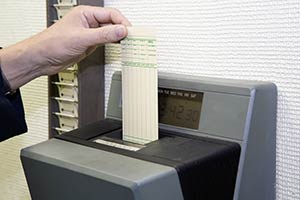Current
informs.
All news at a glance.

We keep you up to date
We bring you the latest developments and news directly to your screen!
Current dates and developments always in view.
Obligation to record working time electronically
A ruling that obliges employers to record all working time electronically is now being standardized by law.
Following a ruling by the European Court of Justice, the Federal Labor Court ruled last year that employers are obliged to introduce a system to record the hours worked by employees. The court based its decision on a provision in the Occupational Health and Safety Act. Under the Working Hours Act, employers previously only had to ensure that overtime and Sunday work was documented.
Apart from the fact that employers cannot complain about an acute lack of bureaucratic requirements, the ruling has raised more questions than it has answered. To date, there are no detailed regulations on how such working time recording should look and what sanctions may otherwise be imposed. The court was also silent on the matter. However, the ruling has brought the Federal Ministry of Labor onto the scene, which is now working on a reform of the Working Hours Act.

It is therefore envisaged that employers will be obliged to electronically record the start, end and duration of the daily working time of all employees on the day they work. Alternatively, the recording can also be carried out by the employees themselves or by a third party. At least the ministry has refrained from tightening the requirements of the European Court of Justice ruling. Nevertheless, this presents employers and employees with new challenges.
Despite the new regulation, trust-based working hours remain possible. However, the law stipulates that employers must take appropriate measures to ensure that they are aware of any breaches of the legal requirements regarding the duration and location of working hours and rest periods if the working hours are recorded by the employee and the employer refrains from monitoring the contractually agreed working hours.
An exception is provided for collective bargaining partners, which allows them to deviate from the legal requirements within certain limits. In particular, it should also be possible for the collective bargaining partners to keep records in paper form instead of the mandatory electronic records. For micro-enterprises with up to ten employees and for domestic helpers, recording in non-electronic form should also be permitted on a permanent basis.
Companies with more than ten employees will at least have a transitional period for setting up electronic recording of working hours. This is at least one year and is extended to two years for companies with a maximum of 250 employees and even five years for companies with no more than 50 employees from the date the law comes into force. However, the legislative process is still in its infancy, so further amendments and clarifications are to be expected.